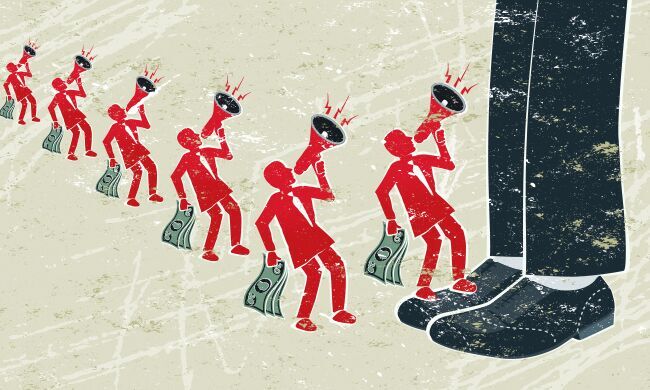Yesterday, I wrote about a new poll from the Associated Press and National Opinion Research Center revealing that a strong majority of Americans oppose tax-financed campaign programs and do not believe they reduce the influence of money in politics. The same poll also asked about contribution limits, Super PACs, disclosure laws, and general attitudes about money-in-politics. Today, I’ll briefly discuss those portions of the poll.
Most notably, a plurality of Americans (47 percent) say that individuals should be able to give unlimited amounts directly to candidates. While support for unlimited contributions is often portrayed as a fringe position by the media, nearly half the country would like to see limits eliminated. Perhaps this explains why 12 states across the country have no limits on what individuals may give to candidates. By contrast, just 24 percent support our current federal system, in which individuals can only give to their preferred candidates in limited amounts. Thirty percent of those surveyed believe individuals shouldn’t be allowed to contribute at all.
Other notable results: 50 percent of Americans say that giving money to candidates is a form of free speech while 48 percent disagree. A strong majority say corporations should be able to spend on campaigns (75 percent), and 37 percent believe corporate spending should be unlimited. Similarly, 79 percent say unions should be allowed to spend on campaigns. It’s worth noting that, despite this support, corporations and unions are currently prohibited from contributing directly to candidate campaigns under federal law.
However, a slim majority of Americans are not supportive of Super PACs, with 51 percent saying it is unacceptable for groups to raise and spend unlimited amounts independent of candidates. (By contrast, 33 percent of respondents are supportive of Super PACs while 16 percent answered that they found the practice neither acceptable nor unacceptable.) Americans’ simultaneous skepticism of Super PACs and support for candidates raising money through individual donors – including in unlimited amounts – is a strong argument for lawmakers to raise federal contribution limits. Many Super PAC donors would undoubtedly prefer to give directly to the candidates of their choice, but low limits prevent them from doing so. Raising limits would be good for candidates, good for the First Amendment, and in line with public opinion.
AP’s news story on the poll opted to lead with its findings on disclosure, but the questions in this area do a poor job of encapsulating the current debate. They ask about “groups that raise and spend unlimited money to support candidates,” and if this means Super PACs, it’s an odd question to ask. Super PACs already disclose their donors, and there has been virtually zero effort to change that.
Instead, today’s debates over disclosure mandates occur at the outer edges of our regulatory system. Should nonprofits that spend only a small portion of their funding on speech about candidates and legislation be forced to file complicated reports with the government in the same fashion as PACs and political parties? Are neutral, informational voter guides published by citizen groups that adhere to IRS guidelines equivalent to TV ads run by candidates? Does mentioning the name of a candidate in an ad about a policy issue count as supporting or opposing their candidacy and deserve to be treated similarly as a political ad?
Nothing in AP-NORC’s poll addresses these topics, and as a result we know only that Americans support some level of political disclosure, not whether they want more or less than what we currently have.
In fact, what seems fairly clear from the poll is that Americans have no clue about the current extent of our disclosure law. Only “13 percent [of Americans] say they understand quite a bit or a great deal about how candidates get money for their campaigns.” If the goal of these laws is to inform the public, they are clearly failing.
Moreover, Americans’ ignorance of campaign funding casts serious doubt on the accuracy of respondents’ view that disclosure would be an effective tool to reduce the influence of money in politics. It may be that media coverage of money in politics so overhypes the role of so-called “dark money” that Americans wrongly assume that disclosure is sorely lacking. In reality, those groups that are not required to report the private information of their supporters to the government account for less than 5 percent of political spending. If Americans don’t know by now how candidates get their money, it’s probably because they don’t really care to.
It’s interesting to see how polls like these are relayed by the media. The most intriguing results – Americans’ preference for a system of private, voluntary contributions over government-run tax-financing systems, the high level of acceptance for unlimited contributions by individuals – mostly flew under the radar, while those showing support for disclosure laws (that already exist) attracted attention. It’s further evidence that the media has its own bias when it comes to campaign finance regulation.














